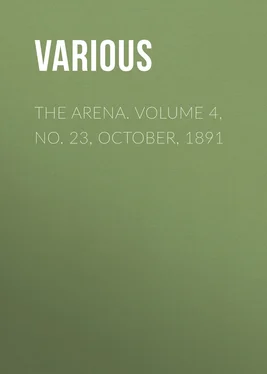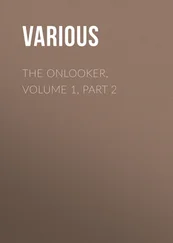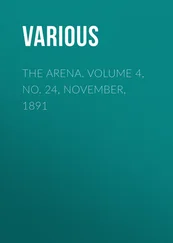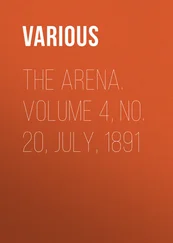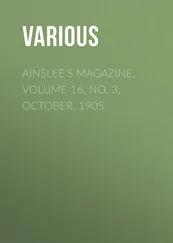Various - The Arena. Volume 4, No. 23, October, 1891
Здесь есть возможность читать онлайн «Various - The Arena. Volume 4, No. 23, October, 1891» — ознакомительный отрывок электронной книги совершенно бесплатно, а после прочтения отрывка купить полную версию. В некоторых случаях можно слушать аудио, скачать через торрент в формате fb2 и присутствует краткое содержание. Жанр: foreign_antique, periodic, foreign_edu, на английском языке. Описание произведения, (предисловие) а так же отзывы посетителей доступны на портале библиотеки ЛибКат.
- Название:The Arena. Volume 4, No. 23, October, 1891
- Автор:
- Жанр:
- Год:неизвестен
- ISBN:нет данных
- Рейтинг книги:3 / 5. Голосов: 1
-
Избранное:Добавить в избранное
- Отзывы:
-
Ваша оценка:
- 60
- 1
- 2
- 3
- 4
- 5
The Arena. Volume 4, No. 23, October, 1891: краткое содержание, описание и аннотация
Предлагаем к чтению аннотацию, описание, краткое содержание или предисловие (зависит от того, что написал сам автор книги «The Arena. Volume 4, No. 23, October, 1891»). Если вы не нашли необходимую информацию о книге — напишите в комментариях, мы постараемся отыскать её.
The Arena. Volume 4, No. 23, October, 1891 — читать онлайн ознакомительный отрывок
Ниже представлен текст книги, разбитый по страницам. Система сохранения места последней прочитанной страницы, позволяет с удобством читать онлайн бесплатно книгу «The Arena. Volume 4, No. 23, October, 1891», без необходимости каждый раз заново искать на чём Вы остановились. Поставьте закладку, и сможете в любой момент перейти на страницу, на которой закончили чтение.
Интервал:
Закладка:
In 1880, he was transferred to London, as “his excellency, the ambassador of American literature to the court of Shakespeare,” as a writer in the Spectator deliciously put it. He had a good field to work in, but, as the duties were light, he had ample time on his hands. He went about everywhere, the idol of all, the most engaging of men. Naturally, his tastes led him among scholars who in their turn made much of him. He was asked frequently to speak or deliver addresses and he always responded with tact. The universities of Oxford and Cambridge conferred on him their highest honors and the ancient Scottish University of Saint Andrew elected him rector,—a rare compliment, Emerson only being the other citizen of the United States so marked out for academic distinction. Some of his compatriots hinted that his English life was making him un-American. Others more openly asserted that the United States minister was fast losing the republic feelings which he took from America, and was becoming a British Conservative. The reply to those innuendoes and charges will be found in his spirited address on Democracy, which proves undeniably his sturdy faith in American institutions, American principles, and American manhood. Mr. Lowell maintained to the letter the political and national views which had long guided his career. His admirable temper and agreeable manner won the hearts of the people, but no effort was made to win him away from his allegiance, nor would he have permitted it had it been tried. In addition to being a great man and a well-informed statesman, he was a gentleman of culture and refinement. His gentleness and amiability may have been misconstrued by some, but be that as it may, the fact remains, he never showed weakness in the discharge of his diplomatic duties. He represented the United States in the fullest sense of the term. In 1885, he returned to America, Mr. E. J. Phelps taking his place, under President Cleveland. Though a Republican, Mr. Lowell differed from his party on the presidential candidate question. He favored the election of the Democrat nominee. Had he been in America during the campaign, he would have been found with Mr. George William Curtis, and his friends, opposing the return of Mr. Blaine. From 1885 to the date of his death, he added little to the volume of his literary work. He spent part of his time in England, and part in the United States. A poem, a brief paper, or an address or two, came from his pen, at irregular intervals. He edited a complete edition of his writings in ten volumes, and left behind him an unfinished biography of Hawthorne, which he was preparing for the American Men of Letters Series.
HEALING THROUGH MIND
Truth may be considered as a rounded unit. Truths have various and unequal values, but each has its peculiar place, and if it be missing or distorted, the loss is not only local but general. Unity is made up of variety, and therein is completeness. Any honest search after truth is profitable, for thereby is made manifest the Kingdom of the Real.
During the fifteen years just past, but more especially within the last third of that period, a widespread interest has been developed in the question: Can disease be healed through mental treatment? If so, under what conditions and subject to what limitations? Has mental healing a philosophical and scientific basis, or is it variously composed of quackery, superstition, and assumption? In the simplest terms, how much truth does it contain? Any candid inquirer will admit that even if a minimum of its claims can be established, the world needs it. If it can be of service in lessening or mitigating the appalling aggregation of human suffering, disease, and woe, it should receive not only recognition, but a cordial welcome.
At the outset, it is proper to state that I have no professional nor pecuniary interest in any method of healing. The evolution of truth is my only object. To this end, critical and impartial investigation is necessary. While a personal experience of great practical benefit first aroused my interest in the subject, I have cultivated conservatism and incredulity in forming opinions, which are made up from a careful investigation of its literature, its philosophy, and its practical demonstrations.
The first point noticeable is the peculiar attitude of popular sentiment toward this movement. The unreasonable prejudice which has been displayed, and the flippant condemnation that it has generally received in advance of any investigation, illy befit the boasted impartiality and liberality of the closing decade of the nineteenth century. When the “Fatherhood of God” and the “Brotherhood of Man” are so much on men’s lips, and when the spirit of altruism is supposed to be at the floodtide, here is what claims to be the essential quality of them all denied even a hearing. The testimony of hundreds of clergymen, philanthropists, Christians, and humanitarians, is classed as “delusion,” and the experience of thousands who have received demonstrations in their own persons [information of which is accessible to any candid investigator], is passed by as an idle tale. It furnishes material for satire to the writer for the religious weekly, and a prolific butt for jokes to the paragrapher of the daily journal. The news of its failures is spread broadcast in bold head-lines by the sensational press. The fact that other kinds of treatment denominated “regular” also fail, seems never to be thought of. The mental healer, regardless of his success, is looked upon as an enthusiast, or worse, and even the citizen who modestly accepts the theory of possible mind-healing, is regarded as credulous and visionary by those who pride themselves upon their practicality. Why does this prejudice exist, when advancement in physical science uniformly meets with a friendly reception?
Perhaps the most important reason why “there is no room in the inn” for truth of the higher realm, is the prevailing materialism. Our western civilization prides itself upon its practicality; but externality would better define it. We forget that immaterial forces rule not only the invisible but the visible universe. Things to look real to us must be cognizant to the physical senses. Matter, whether in the vegetable, animal, or human organism, is moulded, shaped, and its quality determined by unseen forces back of and higher than itself.
We rely upon the drug, because we can feel, taste, see, and smell it. We are color-blind to invisible potency of a higher order, and practically conclude that it is nonexistent.
One reason for the prevailing adverse prejudice is that this new thought disturbs the foundation-stones of existing and time-honored systems and creeds. The literalism and externality of formulated theology are rebuked by the simplicity of the spiritual and internal forces which are here brought to light. The barrenness of intellectual scholasticism is in sharp contrast with the overflowing love and simple transparency which reveal the image of God in every man, and as an incidental result, possible health and harmony.
History ever repeats itself in the uniform suspicion with which advanced thought has been received by existing institutions. It seems difficult to learn the lesson, that the human apprehension of truth is ever expanding, while creeds are but “arrested developments, frozen into fixed forms.” As might be inferred, the clergy and the religious press, as a rule, are distrustful of this advance, and see little that is good in it. It is fair to admit that this disposition is often due more to misunderstanding, than to intentional injustice.
Another cause for its unwelcome reception is that it distrusts the dominant medical systems. All honor to the multitude of noble and brave men who from the old standpoint have battled with disease, and who have ever been on the alert to utilize every possible balm, in order to restore disordered humanity. But systems are tenacious of life in proportion as they are hoary with age. They mould men to their own shape; to break with them is difficult: tradition, pride, professional honor, and loyalty, and often social and pecuniary status, are all like strong cords, which bind even great men to their conventional grooves.
Читать дальшеИнтервал:
Закладка:
Похожие книги на «The Arena. Volume 4, No. 23, October, 1891»
Представляем Вашему вниманию похожие книги на «The Arena. Volume 4, No. 23, October, 1891» списком для выбора. Мы отобрали схожую по названию и смыслу литературу в надежде предоставить читателям больше вариантов отыскать новые, интересные, ещё непрочитанные произведения.
Обсуждение, отзывы о книге «The Arena. Volume 4, No. 23, October, 1891» и просто собственные мнения читателей. Оставьте ваши комментарии, напишите, что Вы думаете о произведении, его смысле или главных героях. Укажите что конкретно понравилось, а что нет, и почему Вы так считаете.
